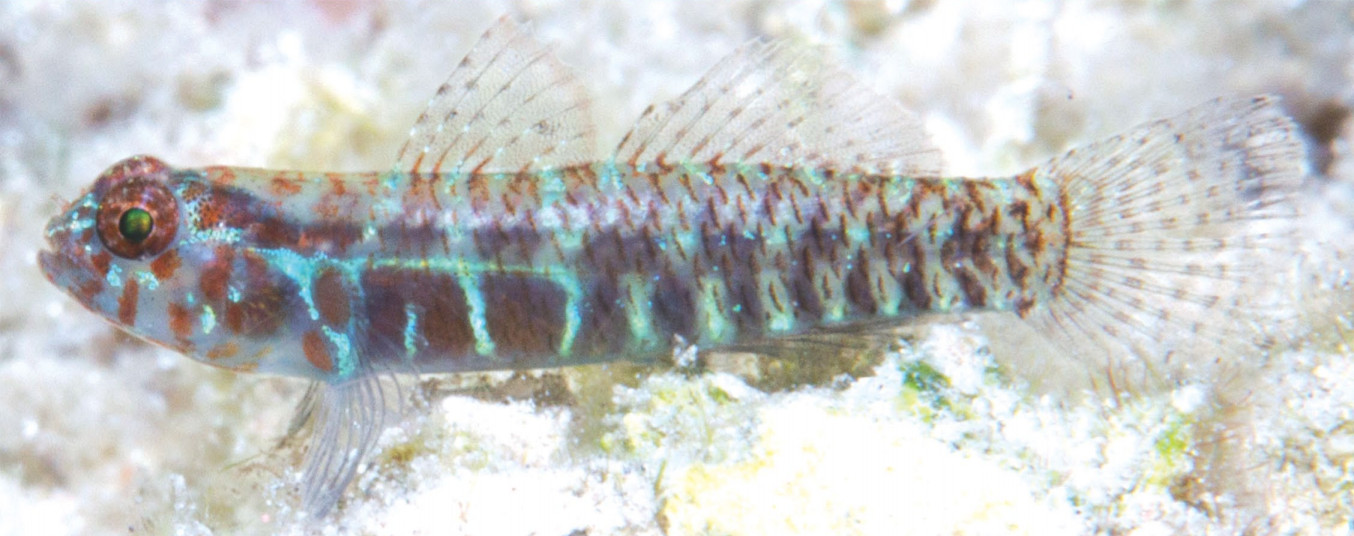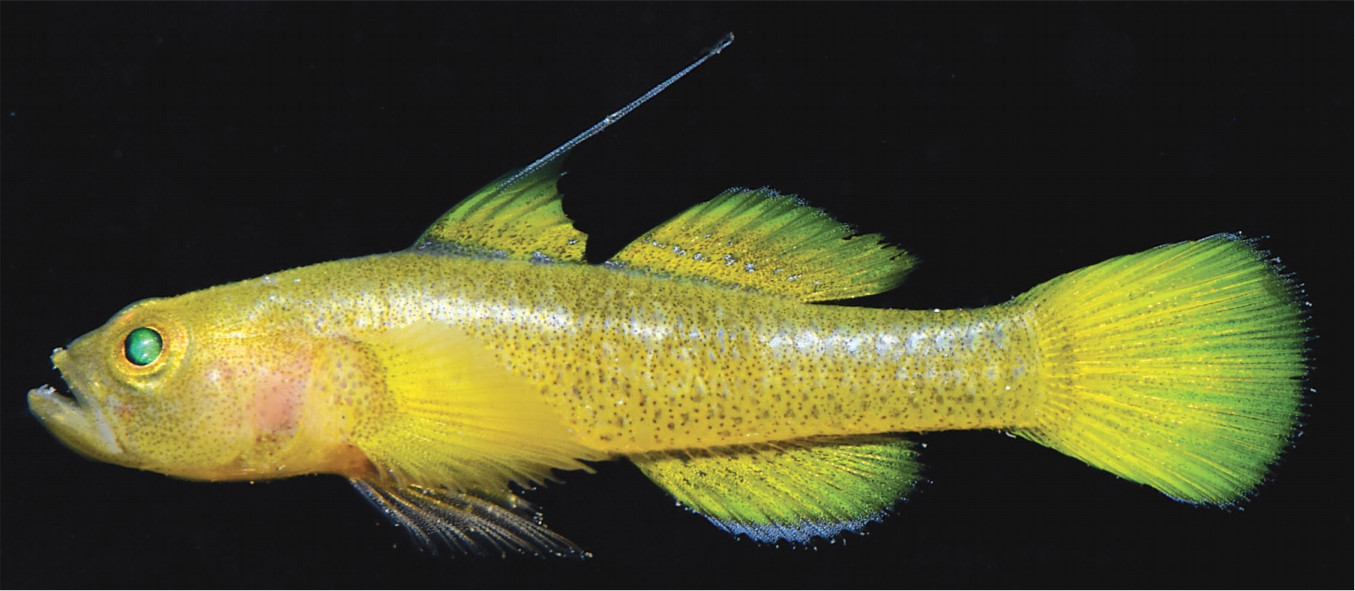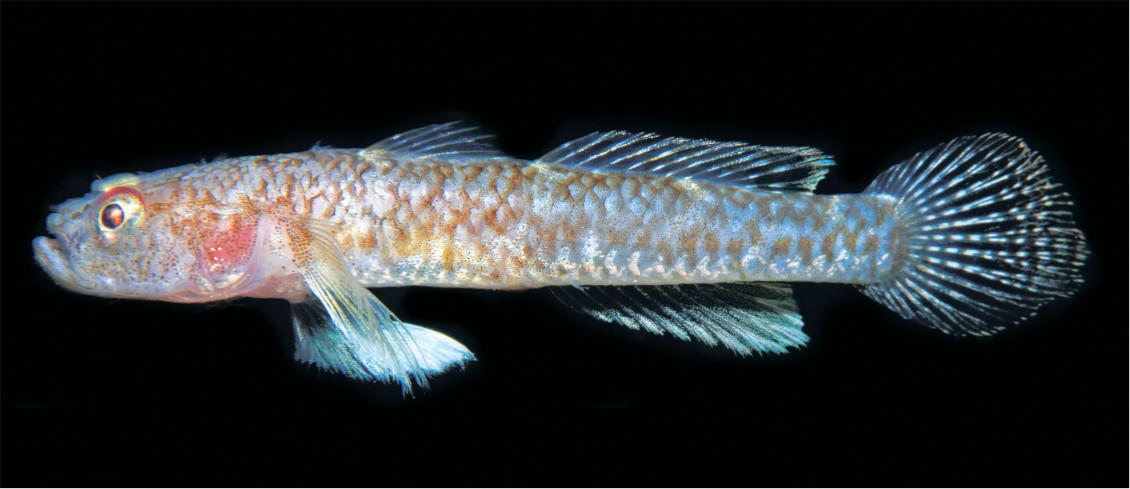The past few weeks have been a busy time for the taxonomy of itty bitty reef fishes. Gobies and blennioids seem to be getting named on an almost daily basis. Three new species, from three different genera, have been described from a single muddy, mesophotic bay in Papua New Guinea! So let’s meet these diminutive additions.
The nicest of the lot seems to be the Citron Mudgoby Priolepis billbrooksi, a wee, yellow creature that grows to less than an inch in length. It was found at Duduwali Bay (Nuakata Island, Milne Bay Province, Papua New Guinea) at a depth of 30 meters in habitat described as a “flat mud bottom”. The species was collected with rotenone (a piscicide commonly used for collecting cryptic fishes), and live specimens were never actually observed. Priolepis often reside in burrows constructed by other reef creatures, and, in its muddy habitat, it’s likely that the Citron Mudgoby is shacking up with Oxymetopon ribbongobies and Opistognathus jawfishes, both observed in the type locality.
Priolepis billbrooksi was named after the son of William Brooks, one of the authors of this paper. The same is true for the Slender Mudgoby Gobiopsis jackbrooksi, and this new species was also found at Duduwali Bay in the same deep, muddy habitat. Gobiopsis is a pretty obscure genus as far as aquarists and divers are concerned. There are now 15 species in the group, all of which are fairly drab in appearance and which occur scattered across the Indo-Pacific. Most of these have peculiar barbels along the lower portions of the head, giving them an endearingly bearded appearance, but this new species is one of three that lack this feature. Whether these are truly close relatives of their hirsute brothers remains to be seen.
The last new goby find reported from Duduwali Bay is the Nuakata Shrimpgoby Tomiyamichthys stuarti, a gold-speckled shrimpgoby that is (you guessed it) named after another member of the Brooks family. Tomiyamichthys has sixteen species now, spread throughout the Indo-Pacific in muddy habitats, and with several more still waiting to be studied. Many of these have dramatic dorsal fins—the filamented fan of T. nudus… the enlarged sail of the undescribed “Flabelligobius” familiar to aquarists… the elongated fin of T. praealtus… or the prowlike T. smithi—but the finnage of T. stuarti is fairly subdued in comparison.

Eviota maculosa, underwater photograph of type series, Teluk Saleh, Sumbawa, Indonesia. Credit: Mark Erdmann / Greenfield et al. 2018
Leaving Duduwali Bay, there was yet another new Eviota goby described (bringing the total to an unholy 115 species!), this time from Sumbawa in Indonesia. The Polkadot Dwarfgoby Eviota maculosa is your typical camouflaged member of this group, with a messy pattern of red spots and streaks set against a vaguely bluish body. Taxonomists had previously confused this species, which apparently occurs widely in the West Pacific, with Fiji’s E. punctulata, a fish that looks nearly identical. Oddly, though they are closely related and share some unusual tricuspid teeth, the available genetic data (CO1) shows a surprisingly significant difference between them. Why are these two interchangeable gobies so distinct at the genetic level when so many other reef fishes show the opposite pattern?

Left: Black-rhino Triplefin Helcogramma melanolancea, from Bali. Right: Helcogramma rhinoceros, from Okinawa. Credit: Hide Diver & maguritaoshi
Finally, let’s round out this tiny fish recap with a non-goby. The evocatively named Black-rhino Triplefin Helcogramma melanolancea is an endearing new species of blennioid described from Bali and reported elsewhere only from nearby Flores in Indonesia. It’s closest relative is the widespread Coral Triangle species H. rhinoceros, and both are unique within the genus for having the upper lip prolonged into a pointy extension. Aside from some minor morphological differences, the Black-rhino Triplefin has a recognizably different nuptial coloration in males. It’ll be interesting to see if any other regional variants from this species group find themselves redescribed as new taxa.
- Allen, G.R., Erdmann, M.V. & Brooks, W.M. (2018) A new species of Priolepis (Pisces: Gobiidae) from Papua New Guinea. Journal of the Ocean Science Foundation, 31, 32–37.
- Allen, G.R., Erdmann, M.V. & Brooks, W.M. (2018) A new species of Tomiyamichthys shrimpgoby (Pisces: Gobiidae) from Papua New Guinea. Journal of the Ocean Science Foundation, 31, 38–46.
- Allen, G.R., Erdmann, M.V. & Brooks, W.M. (2018) A new species of Gobiopsis (Pisces: Gobiidae) from Papua New Guinea. Journal of the Ocean Science Foundation, 31, 47–53.
- Greenfield, D.W., Tornabene, L., Gómez-Buckley, M. & Erdmann, M.V. (2018) Eviota maculosa, a new dwarfgoby from the Western Pacific Ocean (Teleostei: Gobiidae). Journal of the Ocean Science Foundation, 31, 18–31.
- Tashiro, S. and Motomura, H., 2018. Helcogramma melanolancea, a new triplefin (Perciformes: Tripterygiidae) from Bali, Indonesia. Ichthyological Research, pp.1-10.












0 Comments